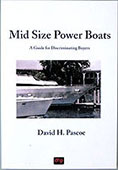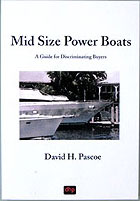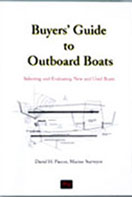Boat Repossession Auctions
January 14, 2008
by David Pascoe
Are boat auctions a good way to find a great deal on a used boat? Having managed a few boat auctions myself, I know a bit about their strengths and weaknesses.
If it's a real auction, there's no way of knowing how the bidding will go. It may be heavy, in which case it drives the price beyond reasonable; the lighter the bidding, the better the chance of getting a low price. The volume of bidding usually depends on the quality or desirability of boats being offered.
Unless a boat is a really hot item such as a Bertram, Hatteras or Viking, bidding on most boats is likely to be rather sparse. On the other hand, boats that are "oddballs," that is, boats that are not popular or well known often go at very low prices.
To begin with, one needs to understand that the purpose of an auction is rarely to merely dispose of assets. Its usual purpose is to attempt to obtain the highest possible price, so the likelihood of a great deal is slim.
Secondly, most auctions I've seen aren't true auctions but merely a secondary market with unusual selling conditions.
One of the best known boat auctions is National Liquidators located in Ft. Lauderdale, a firm I've had many dealings with, and from what I can see via an Internet search, the only one of any standing. There are lots of wannabe "auctions" that have a few boats.
The idea of auctioning a boat is not an easy process due mainly to the difficulty of inspecting the boat since smart buyers always get a survey after making an offer.
Obviously, an auction makes this difficult, if not impossible. National Liquidator''s web site says nothing about "surveys" but if you go to the "services" section, you'll see what amounts to the potential of getting a survey accomplished.
They do make it possible to do a survey but you'll have to pay $6/ft. for haul out and $500 for sea trial in addition to the surveyor's fee. I've done quite a few pre auction surveys and have had little difficulty other than being pushed into time constraints.
Back to the question of whether it's really an auction. My answer is no, it's not. The reason is to be found in the description of the bidding process:
"Yacht and boat auction offers are cut off and opened on Monday at 4:00pm Eastern Time. Bids are sorted and the high offer on each vessel is submitted to the bank, U.S. Marshal's Service or vessel owner on Tuesday mornings. Responses typically occur within 48 hours. The seller, at its sole option, may accept or reject the offer or make a counter offer."
Note the last sentence there. While the setting of minimum bids is commonplace, the option of the seller to reject a bid or make counter-offers is not. That last sentence negates all claim to being an auction, turning it into nothing more than an unusual boat market.
Nor is it unusual to find "auction" boats listed on brokerage sites.
Does that mean there aren't good deals to be had? No, it doesn't, and I can testify that I've seen a few, particularly in times like these. But to find one will take concentrated effort and a lot of time. For starters, one has to be patient, and that's hard to do and also expensive when you're a long way off. Repos are usually neglected boats so the chance of finding a "turn key" boat is not good; they've usually got problems, either large or small.
One way to handle this is to make a deal with a surveyor who is nearby and pay him a reasonable fee to go over and briefly inspect boats of interest that come up, just to let you know if its junk or a gem. You'll probably have to repeat this a number of times before finding something satisfactory, but it will save time and expense. On the positive side is that since this is not a live auction, it's not subject to the sort of irrational bid-up psychology that goes on with live auctions. On a sealed bid basis, other bidders aren't privy to other bids.
What are the chances that the seller counters a bid? I don't know, but it sure makes it hard for the auctioneer to claim he's having an auction when the seller turns it into nothing more than the usual selling process. However, it's reasonable to assume the odds are greater when the "accepted" bid - that is, the one to be countered - is close to the stated minimum.
Now, for the really big question: Are good repo deals turning up? While I can't claim to have made a serious study, I have done some comparisons.
'05 Sea Ray 360 SunD min bid $185k;Yachtworld asking range $229 - $299
'05 Sea Ray 390 MY min bid $330k; YW asking range $299 - $419
'04 Meridian 490 min bid $292k; YW asking range $379 - $439
'04 Formula 370 min bid $180k; YW asking range $150 - $199
'02 Riviera 40 min bid $275k; YW asking range $379 - $439
As you can see, the spread between minimum bid and lowest asking price at Yachtworld is not great. This indicates that while a lot of boats are for sale, there is still not a lot of distress.
What I see is mostly possible fair deals with a sprinkling of possible good ones. I still think we're far more likely to see better deals come March/April and later when there will be even more boat repos.
In summary, auctions are unpredictable; there are bargains to be had, but they don't come easily. The key element is time. If you are diligent and willing to spend the time watching offerings and are patient enough to place numerous bids over a period of time, chances are you'll eventually hit the jackpot. On the other hand, it is very unlikely that you'll get exactly what you want, and therein lies the cost of the discount.

















David Pascoe is a second generation marine surveyor in his family who began his surveying career at age 16 as an apprentice in 1965 as the era of wooden boats was drawing to a close.
Certified by the National Association of Marine Surveyors in 1972, he has conducted over 5,000 pre purchase surveys in addition to having conducted hundreds of boating accident investigations, including fires, sinkings, hull failures and machinery failure analysis.
Over forty years of knowledge and experience are brought to bear in following books. David Pascoe is the author of:
In addition to readers in the United States, boaters and boat industry professionals worldwide from nearly 80 countries have purchased David Pascoe's books, since introduction of his first book in 2001.
In 2012, David Pascoe has retired from marine surveying business at age 65.
On November 23rd, 2018, David Pascoe has passed away at age 71.
Biography - Long version